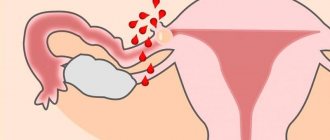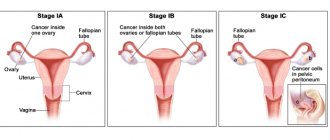How does conception occur?
During ovulation, a mature egg is released into one of the two fallopian tubes.
After sexual intercourse, sperm that enter the vagina rush up the cervix into the uterine cavity, and then into the fallopian tubes, where fertilization occurs. The fertilized egg begins to divide rapidly - pregnancy occurs. Approximately 7-8 days after conception, the dividing egg descends into the uterine cavity and attaches to its wall. From the moment of fertilization, the woman’s body begins to produce the hormone human chorionic gonadotropin (hCG). It is the concentration of this hormone that rapid pregnancy tests react to. However, in the first weeks after fertilization, its content in the blood is too low, which is why pregnancy tests are not reliable in the first weeks after fertilization. But the woman herself can feel the changes that occur in her body under the influence of this hormone.
How to determine pregnancy by symptoms
7. Increased appetite , as well as the appearance in the diet of foods that previously did not arouse interest. “Crafted for something salty” is not just a saying, because during pregnancy a woman’s water-salt balance in her body changes.
8. An integral sign of a recent pregnancy in most cases is morning sickness .
9. Sleepiness, lethargy and general fatigue can also be signs of pregnancy. It is not surprising, because at this time the body devotes all its efforts to preserving the fetus and ensuring its development.
10. Recent fertilization is often accompanied by an increase in colorless discharge.
11. A pregnant girl’s sense of smell often increases : the ability to distinguish the slightest changes and shades of odors appears.
Increased sensitivity and pain in the chest area are added to the combination of other symptoms
13. Pregnant women often experience mood swings. Increased emotionality is one of the signs of pregnancy.
14. Frequent urge to go to the toilet can be one of the signs of pregnancy. However, it is important to exclude cystitis and other inflammations.
Woman's well-being
Signs of early pregnancy are individual and depend on physiological characteristics. Moreover, even for one woman they can differ during different pregnancies. A week after possible conception, a woman may experience fatigue, malaise, drowsiness, a slight heightened sense of smell, or an increased urge to urinate. Sometimes small spotting occurs - the so-called implantation bleeding, which occurs when a fertilized egg attaches to the wall of the uterus. It must be remembered that all these signs are very subjective and should not be relied on.
Basal temperature measurement
Fluctuations in basal temperature reflect the course of the menstrual cycle. So, during the cycle this indicator is approximately 36.5⁰ C. When ovulation occurs, the temperature exceeds 37⁰ C and remains until the onset of the next cycle, falling to 36.5⁰ C the day before the onset of menstruation. However, if the egg is fertilized, the temperature does not drop, but remains at a level above 37⁰ C. This method cannot be called very reliable, since if a woman has hormonal disorders, temperature readings cannot have diagnostic value. In addition, temperature data can be affected by incorrect measurement, stress, overwork or climate change.
Pregnancy tests
Dip and tablet tests that detect pregnancy using a urine sample, as well as blood tests for pregnancy, are related to the hCG hormone. Its blood level doubles every two days in the first weeks of pregnancy. To obtain a reliable result, it is recommended to take a laboratory blood test for hCG no earlier than 3-4 days, and use test strips no earlier than 7 days after a missed period. If the test result is negative and there is no menstruation, you need to repeat the test or consult a doctor.
Your period is late, but the test is negative: what to do?
A delay in menstruation with a negative test is often found in modern women.
Hormonal disorders, excess weight, inactive lifestyle, changing climate conditions, stress - all this provokes menstrual irregularities.
As soon as you notice that your period is a few days late, purchase a pregnancy test at the pharmacy to conduct a home diagnosis. This will make it possible to exclude conception with a high probability and select effective ways to restore the menstrual cycle.
How to recognize a delay in menstruation?
Normally, the menstrual cycle lasts 21-35 days. If the test is negative and there is no menstruation, you need to contact a gynecologist.
The absence of menstruation for more than 5-7 days against the background of a negative pregnancy test is a reason for additional examination.
During diagnosis, the true reasons for the absence of menstruation can be determined.
Keep in mind that a negative test during a delay may be false, especially if you do it on the day of your expected menstruation, when the level of hCG (the hormone that is produced after fertilization and fixation of the egg) is insufficient to determine pregnancy.
Delayed menstruation is divided into several types:
- cycle disorder, which is accompanied by rare menstruation with an interval of 40-60 days, while the duration of menstrual bleeding is only 1-2 days;
- the cycle lengthens, lasts more than 35 days, and menstruation is delayed;
- absence of menstruation for more than 6 months.
The usual delay in menstruation lasts several days and does not pose a threat to health. But if menstruation constantly comes irregularly, is delayed by weeks or months, then you need to sound the alarm.
Signs of delay due to cycle disorders are practically no different from the manifestations of the first weeks of pregnancy. The symptoms for both of these conditions are similar.
Delayed menstruation and possible pregnancy
How can a woman understand that she has a slight delay or is pregnant? The ideal solution would be to conduct a test. If the results are questionable, a barely noticeable second line appears, be wary and consult a doctor.
Test again the next day. Buy it from another pharmacy to eliminate the risk of using low-quality products. The sooner you find out about your pregnancy, the better. If you have even the slightest doubt, it is better to consult a gynecologist before taking any medications or using treatment methods.
In the early stages, pregnancy can be accurately determined only by the results of an ultrasound (ultrasound) or a blood test for the presence of hCG (pregnancy hormone).
An ultrasound examination allows not only to confirm conception, but also to determine the number of fetuses, determine the fetal heartbeat and assess the risk of miscarriage based on the condition of the uterus.
You can independently suspect the development of pregnancy against the background of a delay in menstruation only based on presumptive signs:
- increase in basal temperature (the lowest temperature reached by the body during rest) to 36.9-37.1°C: by the beginning of the first phase of the menstrual cycle it usually has lower values, which indicates the imminent onset of menstruation;
- engorgement of the mammary glands;
- mood swings;
- change in the color of the external genitalia: the mucous membrane of the genitals and vagina acquires a bluish tint (this happens due to high blood supply);
- nagging pain in the lower abdomen: they occur against the background of attachment of the embryo to the walls of the uterus.
Reasons for missed periods in the absence of pregnancy
Why am I not having my period but the test is negative? Every modern woman has asked this question at least once in her life.
Even the most effective methods of contraception are not 100% guaranteed. Therefore, any delay should alert the woman and force her to take a simple pregnancy test.
The causes of menstrual irregularities and absence of menstruation can be very different:
- stressful situations, severe emotional shock;
- frequent weight fluctuations, severe dietary restrictions;
- change of climate zone;
- starting to take hormonal contraceptives, switching to another method of preventing unwanted pregnancy;
- recent genital surgery;
- hormonal diseases;
- obesity or, conversely, underweight;
- past abortions;
- inflammatory processes of the genitourinary organs;
- neoplasms of the uterus and ovaries.
The main reason for a delay in menstruation with a negative test is a disruption in the cycle caused by stress or hormonal changes. If such a problem occurs periodically, we can talk about persistent menstrual irregularities.
Only a gynecologist can make an accurate diagnosis after receiving complex diagnostic data. When contacting the clinic, a woman will be asked to undergo an examination, laboratory blood tests, and ultrasound.
The sooner you seek help from specialists, the sooner you will be prescribed effective treatment for cycle disorders and detected diseases. Don't forget to bring your past examination data to your doctor's appointment. Experts ask some women to show a menstrual calendar, which reflects the consistency, duration and other features of the menstrual cycle.
In recent years, women have begun to take the periodic absence of menstruation lightly and frivolously. They are in no hurry to consult a gynecologist, which leads to a delayed start of treatment and a disastrous result.
Many benign tumors of the genital organs grow without significant pain or discomfort, but they often disrupt the cycle due to hormonal imbalances that occur.
Any delay in menstruation with a negative test is a cause for concern. The regularity of the menstrual cycle is an indicator of women's health. If you do not pay close attention to it and miss alarming symptoms, then in the future there may be problems with conception, bearing a child and childbirth.
A woman’s hormonal background reacts sharply to adverse effects: stress, treatment with antibiotics and other potent drugs, alcohol consumption, smoking, climate change.
Menstruation may disappear if you become interested in sports, when the body is subject to serious stress, especially combined with diet therapy.
Cycle disturbances often appear during vacation, when a woman spends a lot of time under the scorching sun and abruptly switches to a different diet.
Almost always, menstrual cycle disorders occur due to hormonal imbalance, malfunction of the glands involved in the regulation of the basic functions of the body and the ovaries. And, as you know, hormones directly affect a woman’s condition - her beauty, mood, performance and life expectancy. The longer menstrual function is maintained, the better the woman will feel.
When the production of female sex hormones ceases, the risk of developing arthrosis (age-related joint deformation), arthritis (joint deformation independent of age) and other joint pathologies, as well as cardiovascular diseases, increases sharply.
What to do if your period is late and the test is negative?
A negative test during a delay is a reason to contact your gynecologist. Do not rush to take the test on the day of your expected menstruation - wait 2-3 days. This period is considered harmless - a slight deviation in the date of menstruation is a variant of the norm.
It is better to take two pregnancy tests from different manufacturers. Then the probability of obtaining a false negative result will be practically reduced to zero.
Do not try to induce menstruation using dangerous and untested methods of traditional medicine - this can lead to bleeding and increased signs of the underlying disease.
The duration of the menstrual cycle is controlled by sex hormones, which can only be influenced by special medications. They should be selected by a doctor - and only on the basis of laboratory diagnostic data, determination of hormone levels in the blood and ultrasound results.
If you seek help in a timely manner, cycle disorders can be easily corrected.
So, if your pregnancy test is negative and you have not had your period, make an appointment with a gynecologist to dispel all doubts and begin treatment in a timely manner if irregularities are discovered. Every woman should maintain her health for as long as possible, because this is the key to her femininity, beauty and physical activity.
Ultrasound and doctor's examination
The doctor will be able to determine pregnancy, or rather, detect the fertilized egg, using an ultrasound examination with a transvaginal sensor approximately 5-6 days after the delay of menstruation or 3-4 weeks after fertilization. This method is considered the most reliable, although this study is usually prescribed at a later date. Without an ultrasound, during an external examination at the earliest stage of pregnancy, the doctor will be able to determine pregnancy.
History of contraception Ancient times One of the first mentions of a condom as a means of protection in antiquity - approximately 3000 BC. In Cretan... Read more
HIV infection: causes and symptoms of infection What is HIV infection HIV infection is a disease caused by infection with the human immunodeficiency virus (HIV). This virus is slowly...
More details
Intrauterine Device An intrauterine device is a small plastic device that is inserted inside the cervix and provides contraceptive…
Read more
Traditional methods
If you can’t resort to medical technologies, try to determine pregnancy without a test in the early stages using traditional methods at home. It is better to carry them out in the morning - you will need a morning portion of urine.
No. 1. Urine and iodine
To determine pregnancy without a test, collect urine in a transparent container and add a little iodine (a few drops are enough). If you are expecting a baby, the iodine will collect in one drop on the surface. If it dissolves, it means that conception did not happen this time.
No. 2. Paper and iodine
To determine pregnancy at home without a test, dip paper into a container of urine. Then drop potassium iodide on it. For expectant mothers, it will change color - it will turn purple. For the rest of the girls it will turn blue or not change color. This method should be trusted, although there may be errors due to the different composition of the paper.
No. 3. Urine and soda
In the morning, urinate in a glass bowl and pour soda into the urine (1 teaspoon is enough). To determine pregnancy without a test in the early stages, look at what happens to the powder: it settles - wait for a new addition to the family, bubbles appear - alas.
No. 4. Boiled urine
To find out whether you are pregnant or not at home without a test, try this method. Boil the urine and pour it into a glass vessel. Wait until it cools completely and look at the bottom of the dish. If you see sediment, conception has occurred. But don’t rush to rejoice, because the method is not the most reliable. Urine contains protein that coagulates when boiled. Therefore, you may confuse it with sediment.
No. 5. Urine and potassium permanganate
To determine pregnancy without an early pregnancy test, collect morning urine. Separately, make a weak solution of potassium permanganate and combine everything 50/50. The liquid has turned white - rejoice.
No. 6. Urine and wine
You will need morning urine and wine. Combine both liquids in a 1:1 ratio in a clean glass container. For the expectant mother, the resulting solution will become a cheesy consistency, for other girls it will remain transparent. But you should not completely trust this method, because the result depends on the quality of the wine. If it contains additives or dyes, the result may be false.
No. 7. Pulsation below the navel
Lie down on a flat surface and relax. Find a point 7 cm below the navel and press on it. If you feel a pulsation, it means you are expecting a baby. Please note that if you are nervous and take this test too seriously, your heart may be racing.










